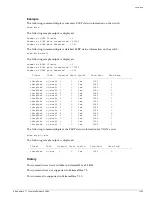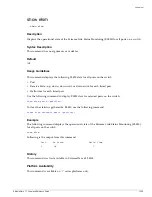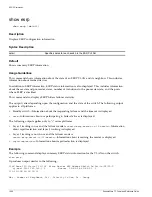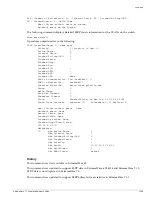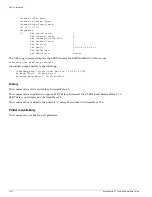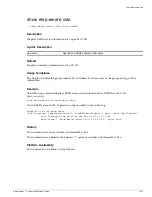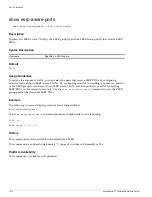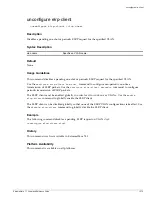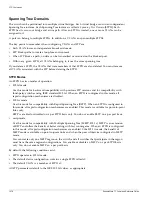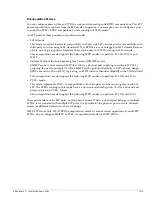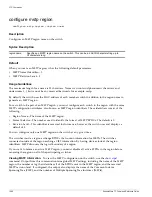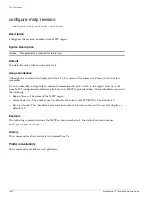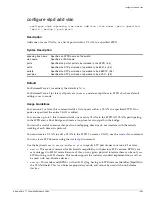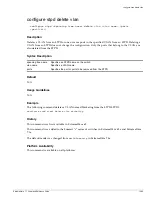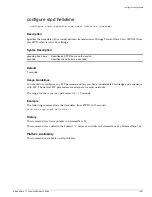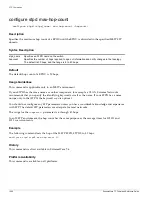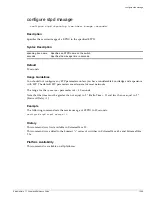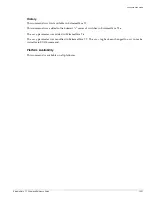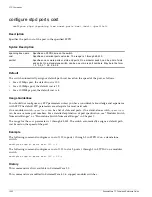
ExtremeWare 7.7 Command Reference Guide
1577
18
STP Commands
This chapter describes commands related to:
•
Creating, configuring, enabling, and disabling Spanning Tree Protocol (STP) on the switch
•
Enabling and disabling Rapid Spanning Tree Protocol (RSTP) on the switch
•
Displaying and resetting STP settings on the switch
The Spanning Tree Protocol (STP) is a bridge-based mechanism for providing fault tolerance on
networks. STP is a part of the 802.1d bridge specification defined by the IEEE Computer Society. To
explain STP in terms used by the 802.1d specification, the switch will be referred to as a bridge.
STP allows you to implement parallel paths for network traffic, and ensure that:
•
Redundant paths are disabled when the main paths are operational.
•
A redundant path is enabled if the main path fails.
The Rapid Spanning Tree Protocol (RSTP; 802.1w) provides an enhanced spanning tree algorithm that
improves the convergence speed of bridged networks. RSTP takes advantage of point-to-point links in
the network and actively confirms that a port can safely transition to the forwarding state without
relying on any timer configurations. If a network topology change or failure occurs, RSTP rapidly
recovers network connectivity by confirming the change locally before propagating that change to other
devices across the network. For broadcast links, there is no difference in convergence time between STP
and RSTP.
RSTP supersedes legacy STP protocols, supports the existing STP parameters and configurations, and
allows for seamless interoperability with legacy STP.
The Multiple Spanning Tree Protocol (MSTP), based on IEEE 802.1Q-2003 (formerly known as IEEE
802.1s), allows the bundling of multiple VLANs into one spanning tree topology. MSTP logically
divides a Layer 2 network into regions. Each region has a unique identifier and contains multiple
spanning tree instances (MSTIs). All MSTIs are bound together using a common instance spanning tree
(CIST). The CIST is responsible for creating a loop-free topology across regions while MSTIs control the
topology inside the regions.
MSTP uses RSTP as its converging algorithm and is interoperable with the legacy STP protocols: STP
(802.1D) and RSTP (802.1w).
Summary of Contents for ExtremeWare 7.7
Page 60: ...60 ExtremeWare 7 7 Command Reference Guide Contents ...
Page 72: ...72 ExtremeWare 7 7 Command Reference Guide Command Reference Overview ...
Page 404: ...404 ExtremeWare 7 7 Command Reference Guide VLAN Commands ...
Page 472: ...472 ExtremeWare 7 7 Command Reference Guide QoS Commands ...
Page 492: ...492 ExtremeWare 7 7 Command Reference Guide NAT Commands ...
Page 890: ...890 ExtremeWare 7 7 Command Reference Guide Security Commands ...
Page 1130: ...1130 ExtremeWare 7 7 Command Reference Guide Security Commands ...
Page 1164: ...1164 ExtremeWare 7 7 Command Reference Guide Configuration and Image Commands ...
Page 1436: ...1436 ExtremeWare 7 7 Command Reference Guide Wireless Commands ...
Page 1490: ...1490 ExtremeWare 7 7 Command Reference Guide EAPS Commands ...
Page 1576: ...1576 ExtremeWare 7 7 Command Reference Guide ESRP Commands ...
Page 1774: ...1774 ExtremeWare 7 7 Command Reference Guide IP Unicast Commands ...
Page 1914: ...1914 ExtremeWare 7 7 Command Reference Guide IGP Commands ...
Page 2000: ...2000 ExtremeWare 7 7 Command Reference Guide BGP Commands i Series Switches Only ...
Page 2140: ...2140 ExtremeWare 7 7 Command Reference Guide IPX Commands i Series Platforms Only ...
Page 2156: ...2156 ExtremeWare 7 7 Command Reference Guide ARM Commands BlackDiamond Switch Only ...
Page 2168: ...2168 ExtremeWare 7 7 Command Reference Guide Remote Connect Commands ...
Page 2346: ...2346 ExtremeWare 7 7 Command Reference Guide PoS Commands BlackDiamond Switch Only ...
Page 2446: ...2446 ExtremeWare 7 7 Command Reference Guide LLDP Commands ...
Page 2496: ...2496 ExtremeWare 7 7 Command Reference Guide H VPLS Commands BlackDiamond Switch Only ...
Page 2620: ...2620 ExtremeWare 7 7 Command Reference Guide Index of Commands ...

